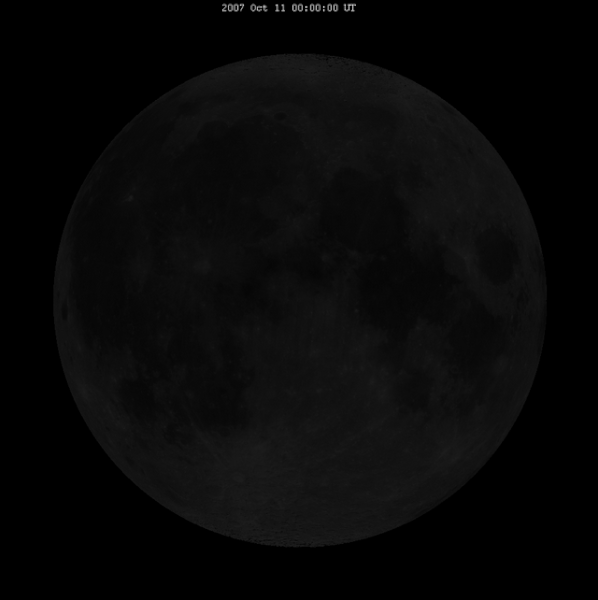
Last week, loyal reader Elliot relayed to as an important Science-related question that a drunk homeless man asked him: How many timezones does the Moon have?
Wow. That is a fucking good question. Since Google yielded no useful results (seriously, if someone can find an decent answer to this question on the tubes, we'll give them 100 Science Points) we decided to institute what will hopefully become a regular feature on PS: Ask Praise Science, where you, the readers, ask us important (and hopefully non-Googleable) Science-related questions that we try our best to answer for you. So on that note, here is our best answer to Elliot's question:
How many timezones are on the Moon? Well, that depends on how you look at it. Once upon a time on Earth, Scientific men invented timezones so that uncivilized provincial train station employees would no longer make them miss their trans-continental trains to important Scientific events across the country by relying on primitive instruments and concepts such as sundials and solar time. What this means is basically we have a timezone for each hour of the day, so things like transportation and communications can easily be standardized.
So, the concept of a timezone itself is essentially contrived to satisfy a functional human requirement. Based on this, we have to ask whether or not the Moon actually NEEDS timezones. Near-future moon bases and missions will likely use a standardized Earth time for operational purposes, since the length of the lunar day (or a full lunar cycle) is approximately 655.75 hours long as opposed to Earth's 24 hours (for all you Pink Floyd fans, the dark side of the moon is myth; all parts of the moon are equally exposed to the sun at some point during a full lunar day).
Taking this into consideration, if the traditional notion of timezones is applied to the lunar day (one timezone per hour) that would mean that the Moon would probably have 655 or 656 timezones. If the 24 timezones of Earth were to be projected onto the moon, each time zone would be about 27.3 hours apart, which kind of defeats the purpose of timezones to begin with. Both of these options would most likely be totally counter-productive to any Earth-Moon synchronization efforts. I say just set universal Moon-time to Greenwich-Mean-Time or something like that, and call it good.
Hopefully that wasn't too long and that it satisfies you, Elliot. Readers, if you like "Ask Praise Science", please let us know and request some more topics in the comments section!
Wednesday, May 7, 2008
Ask Praise Science, Episode 1: Time Zones on the Moon
Labels:
Ask Praise Science,
outer space
Subscribe to:
Post Comments (Atom)
8 comments:
Very Nice Analysis Peter.
The 24 hour clock is certainly an artifact of our terrestrial existence, along with things like daylight savings. Trying to map this onto other celestial objects is difficult.
Anyways some related link I found:
Universal Time, which is really GMT, but sounds cooler and is used by NASA http://eclipse.gsfc.nasa.gov/SEhelp/TimeZone.html
Time on Mars
http://en.wikipedia.org/wiki/Time_and_date_on_Mars
True, the moon doesn't need timezones, but it's worth thinking about this question BEFORE we colonize it.
I'm starting to think that there would be fewer timezones on the moon than on earth, since the concept of timezones came about as a psychological function of human speed of travel.
Ugh, this is making my brain hurt. Since the only system of time we currently have is based on Earth's axial rotation, I have a hard time conceptualizing the need for a unique system of time for the moon. And since 'day' and 'night' on the Moon are so much longer than on Earth, using Earth time there with different time zones would be totally confusing for anyone there. Hence why I advocate using Universal Time for Moon missions in the future.
I would have to agree with Peter. Firstly because keeping an Earth Base universal time would greatly simplify things, and secondly the fact that our Circadian rhythm is roughly based on the 24 hour cycle as well. A base on the moon would likely simulate an Earth like day-night cycle, simply so our human brains could cope. So keeping an Earth based time system anchored on some universal time would make sense.
Universal time is also based on the earth's rotation. I think you pointed to an important idea though. creating another time system that is comparable to the earth's by some basic unit(dear god let's hope it's more than a second) could be necessary.
circadian rhythms are actually not as steady as you think. they are on about 25 hour clock and tend to shift forward in time. This also brings up a good point. Breaking with millions of years of human sleep regulation could be difficult.
these points seem to contradict each other. on one hand we need a new system for the moon, on the other hand, we can't cope with a new system.
So just to correct: There is nothing mythical about the Dark Side of the Moon.
A. There is always a side of the moon that is "dark" just as there is always a side of the earth that is "dark" because it does not have sunlight shining on it. If the entire moon were exposed to light at all times how would the astronauts sleep?
B. The far side of the moon (the side that scares astronauts because they lose radio contact) is always "dark" because it is not blessed by our radiant gaze at night.
Yes, that's correct. But the popular notion that one hemisphere of the Moon is forever facing away from the Sun is incorrect. Also, if astronauts relied solely on day and night to regulate their sleep, they would be screwed, since lunar sunrises/sunsets occur at 13.65 day intervals.
Post a Comment